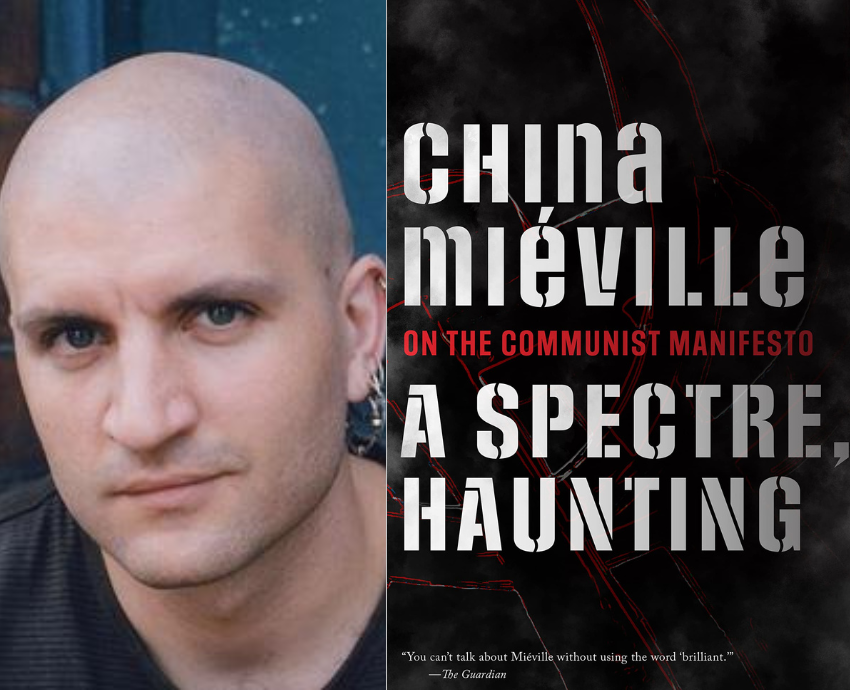
A Spectre Haunting: On the Communist Manifesto
By China Miéville
Haymarket Books, 2022
My brother knows Karl Marx,
He met him eating mushrooms in the people’s park,
He said “What do you think about my manifesto?”
“I like a manifesto, put it to the test-o”
— “Where’s My Jumper”, by Irish punk rock band The Sultans of Ping
“Who would you be not to hate this hateful system? … To be a socialist is to yearn.”
— China Miéville, online discussion of A Spectre Haunting, January 30
British author China Miéville’s fiction is an alternative-world creator. Therefore, it is fitting that he has written this very readable book about the concept of alternative world-creation in Karl Marx and Friedrich Engels’ Communist Manifesto.
A self-declared Marxist and proudly working-class, Miéville does fine work here. The author of many iconoclastic sci-fi and fantasy novels, including Perdido Street Station, The City and the City and Embassytown, Miéville has also published some young readers’ fiction and the history book, October: The Story of the Russian Revolution.
He is a founding editor of Salvage, a socialist periodical that looks towards a future emerging from the wreckage of late capitalism. Elected in 2014 as a Fellow of the Royal Society of Literature, Miéville describes his fantasy writing as “weird fiction”. He is an unapologetic communist. In a recent interactive online discussion of his work, he impressed me as both good-humored and deadly serious.
In A Spectre Haunting, Miéville seeks to present The Communist Manifesto as an essential source of much of his own thinking and as an accessible, inspirational and indispensable living document, worthy of fresh reading by a contemporary audience.
The concept of "rupture" (changing the status quo through irreversible and most likely violent acts of revolution) is key to Miéville’s reading of the Manifesto. A Spectre Haunting includes the complete Manifesto as an appendix, and various prefaces added by Marx and Engels over the years, with explanatory footnotes to clarify translation.
Miéville provides commentary on the Manifesto, and a historical contextualisation of the work, explaining the various philosophical differences guiding Marx and Engels as they chose what to include. He explains that Marx, with Engels’ help, wrote his Manifesto on a pressing deadline, in the revolutionary year 1848, at the behest of a grouping then called The League of the Just.
The “Communist Party” referred to in the Manifesto’s original title refers to a general position, rather than a specific political party. Miéville also points out that Marx and Engels in later years came to use the terms “socialist” and “communist” interchangeably.
Miéville applauds the bold rhetorical stance of the Manifesto. Marx and Engels knew that the number of committed communists in their time was very small and divided among factions, and yet they threaten the power of the bourgeoisie and the capitalists fearlessly, almost recklessly, predicting a fierce rising of an at-last-united, enraged proletariat.
Their clarion call met with an enthusiastic reception. The Manifesto was reprinted and passed from hand to hand during times of capitalist crisis, bringing a class together through the power of class consciousness, in the Manifesto’s rousing words.
Miéville urges his present-day comrades towards close and intelligent reading of this document, writing: “The only reasonable way to read the Manifesto — or anything — is to be as flexible as the text itself.
“To proceed with rigor that’s both sympathetic and suspicious, allowing for grey areas, uncertainties and good-faith disagreements. What errors and fallacies there are must be counted as such, without inferring that in and of themselves they necessarily fatally wound the text.
“We should strive to read as generously as possible — and to read ruthlessly beyond that generosity’s limits.”
Miéville accepts many of the criticisms that have over the years been levelled at the Manifesto, including its authors’ excessive optimism and their failure to adequately address issues of race, gender and nationalism. Miéville is astute in his historical discussion of race as addressed by Marxist theory and practice.
Refreshingly, and perhaps surprisingly, Miéville embraces the emotional and even spiritual power of this book written by declared or presumed atheists, and accepts that reading the Manifesto can bring on a sort of religious ecstasy, though he condemns any tendency towards dogmatism that might be associated with such emotionalism.
He gives us a fascinating story of workers who insisted on having copies of the Manifesto buried with them. He also argues that, per his own reading of the Manifesto, hate may be the strongest force in political life, leading to global class war that ultimately and paradoxically opens the way towards peace and universal human love.
A Spectre Haunting, like the Manifesto, is a stimulating and challenging, if not terribly difficult, read. I highly recommended it. It should lead readers towards comradely argument, discussion and action.